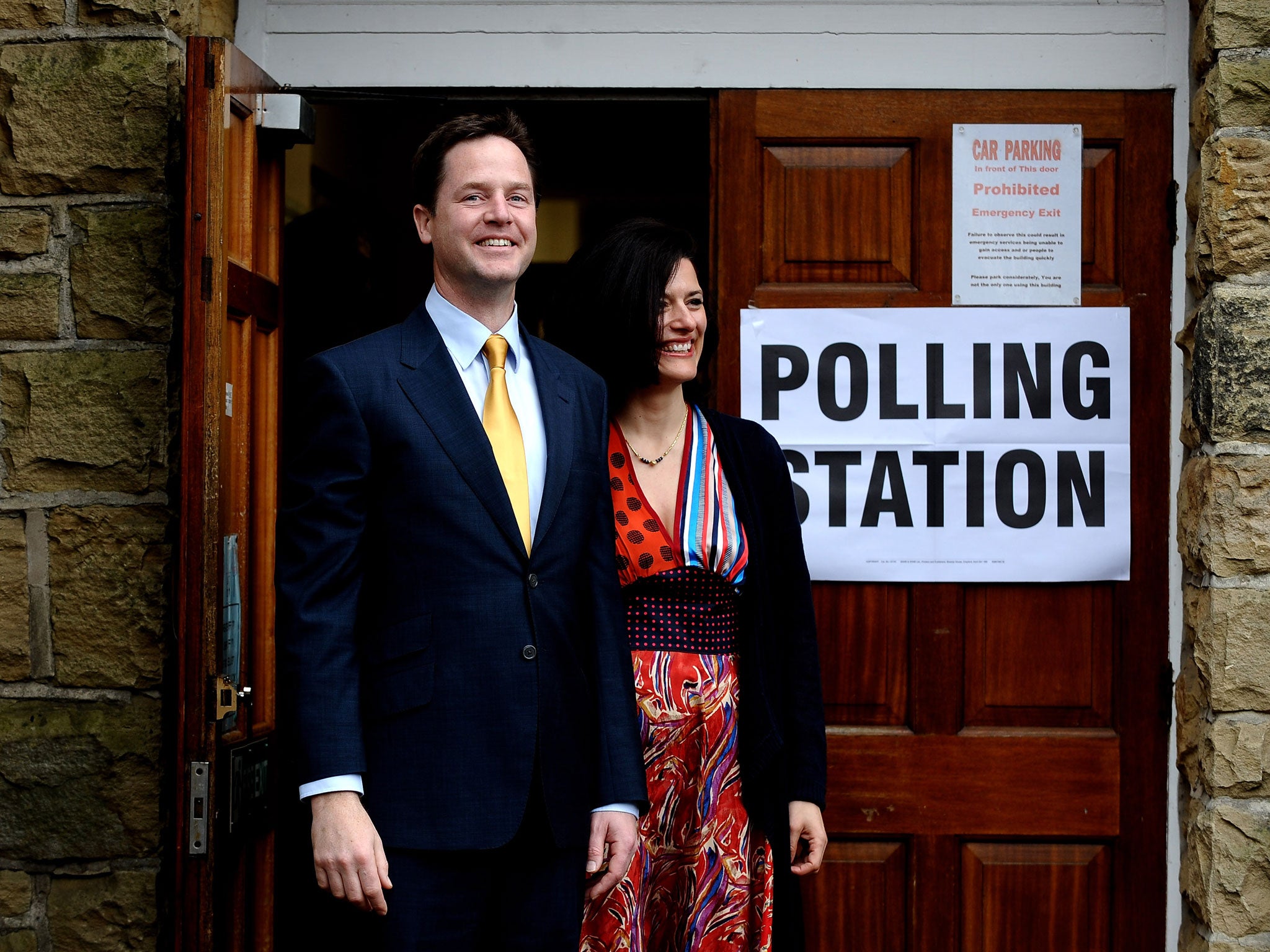TV debates leave Lib Dems' poll ratings at their lowest point since 2010
Findings suggest gamble of challenging Nigel Farage to TV debates on Europe may have backfired

The Liberal Democrats have slumped to their lowest rating since the 2010 election as the UK Independence Party’s rise continues, according to The Independent’s “poll of polls.”
The findings suggest that Nick Clegg’s gamble of challenging Nigel Farage to two broadcast debates on Europe may have backfired. In the month when they were held, the Lib Dems’ rating dropped two points to just nine, while Ukip's rose two points to 13 per cent. Even at the height of the 2010 row over the Lib Dems’ U-turn on university tuition fees, the party scored 11 per cent in the “poll of polls”.
The Deputy Prime Minister had hoped the debates would attract support from voters committed to Britain’s EU membership, boosting his party’s prospects of avoiding a bloodbath at the Euro elections. If the Lib Dem vote is in single figures, the party could lose all its 12 MEPs.
If that happened, some of Mr Clegg’s Lib Dem critics say the party would have a “last chance” to ditch him before next year’s general election. But his allies insist he will lead the party “up to and beyond” the election.
John Curtice, professor of politics at Strathclyde University, who compiled the “poll of polls”, said: “Any hopes that the debates with Nigel Farage would help restore Lib Dem fortunes have proven badly misplaced. Clegg’s personal ratings have shown no sign of improvement. His party’s poll standing is as low as it has been at any point in this parliament. As a result the party’s run of poll results over the last six months has been its worst period yet. Time to restore the party’s fortunes in advance of the general election is beginning to run out.”
Prof Curtice said the two debates were followed by a marked improvement in Mr Farage’s personal ratings. “Clegg’s tactical mistake and the continuing unpopularity of the principal Westminster alternatives have created a perfect environment for Ukip success on 22 May. At 13 per cent, Ukip’s Westminster support is higher than it has been at any time other than immediately after last year’s local council success in May 2013,” he said.
Another sign of the Lib Dems’ problems is that the party is fielding about 500 fewer candidates in the local authority elections next month than it did when the seats were last fought four years ago. In the London boroughs, Mr Clegg’s party will contest 1,174 of the 1,861 seats, 181 fewer than in 2010.
The weighted average of polls by ComRes, Ipsos MORI, YouGov and Populus shows that the Conservatives’ mini-bounce after the March Budget was short-lived. The party is down one point on the previous month to 32 per cent, while Labour is up one point to 37 per cent. If repeated at next year’s election, these figures would see Ed Miliband secure an overall majority of 70 and the Lib Dems would see their number of MPs more than halved to 25.
Lib Dem strategists insisted that going head to head with Mr Farage was the right decision. They pointed to polls showing a majority of people want to remain in the EU and hope that the Lib Dems’ rating will improve as voters focus more closely on Europe in the run-up to next month’s elections.
One senior Lib Dem source said: “We have set the agenda. We are the only party standing up for Britain being in Europe. At least the Lib Dems and Ukip have a clear position - in or out - unlike Labour and the Tories. We knew that public opinion was not going to change overnight.”
Prof Curtice said all three main parties enter next month’s Euro and council elections in a much weaker state than they would like. The improving economy appears to be a “voteless recovery” for the Tories, whose ratings are lower than before the “omnishambles Budget” of 2012. But Labour continues to poll less than 40 per cent, and Mr Miliband’s campaign on the cost of living has not improved his party’s standing, even though it boosted his personal ratings. “There continues to be little evidence that Labour has gained economic credibility in the eyes of the electorate,” said Prof Curtice.
In a report published on Tuesday, the IPPR think tank warned that a strong showing for Ukip in the Euro elections could increase the chances that Scots will vote to leave the UK in the September referendum on independence.
Polling by YouGov found that Ukip’s appeal is much stronger among people who think of themselves as “English” rather than “British.” The IPPR’s Glenn Gottfried said: “The English are the most Eurosceptic, while the Scots are the most positive about Britain’s [EU] membership. These differences in outlook between England and Scotland could have an impact on the Scottish independence referendum.”
Subscribe to Independent Premium to bookmark this article
Want to bookmark your favourite articles and stories to read or reference later? Start your Independent Premium subscription today.

Join our commenting forum
Join thought-provoking conversations, follow other Independent readers and see their replies